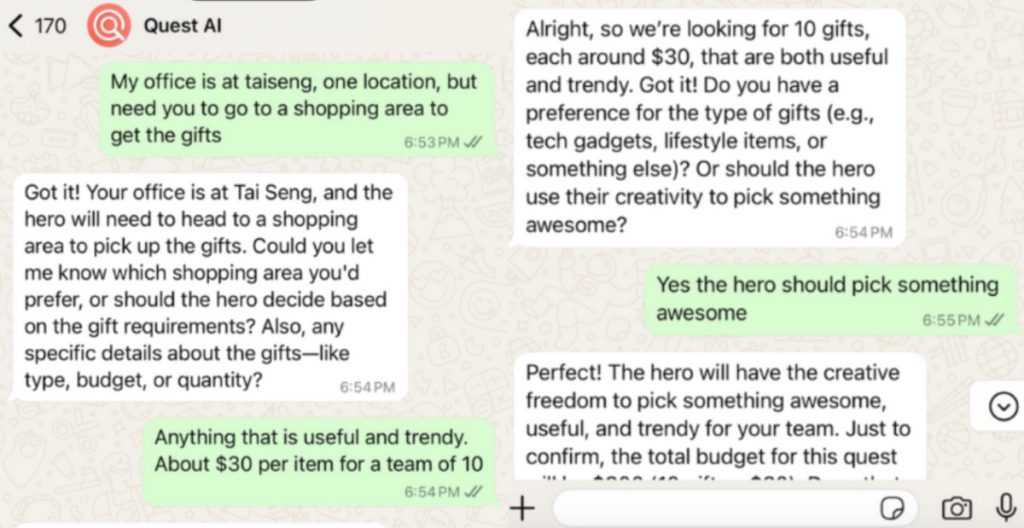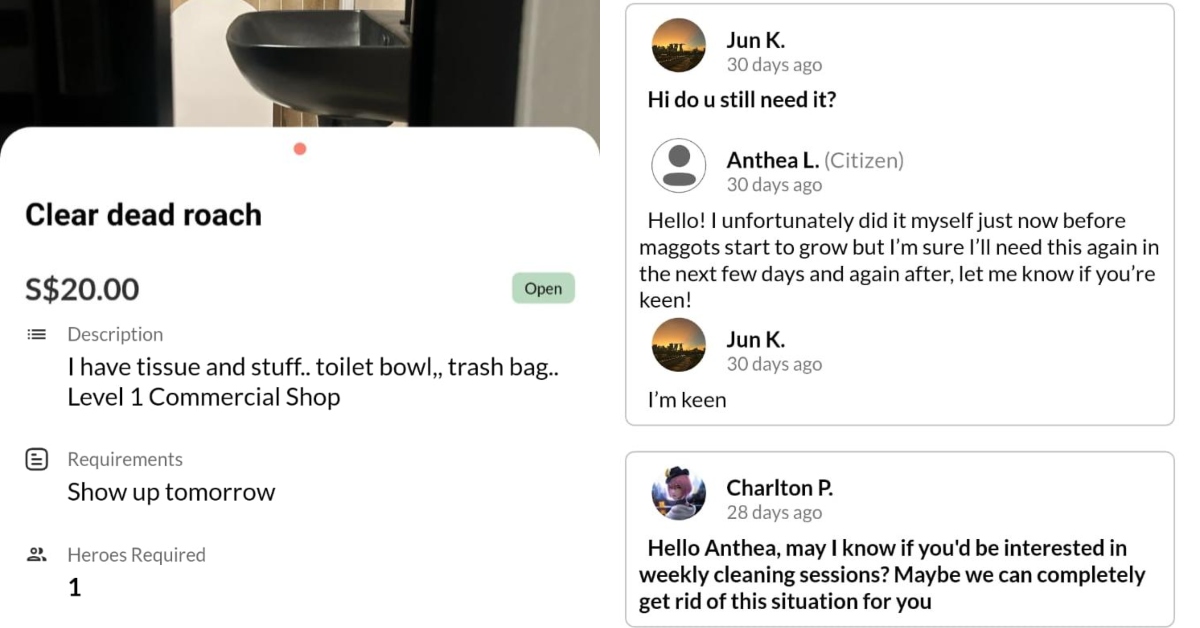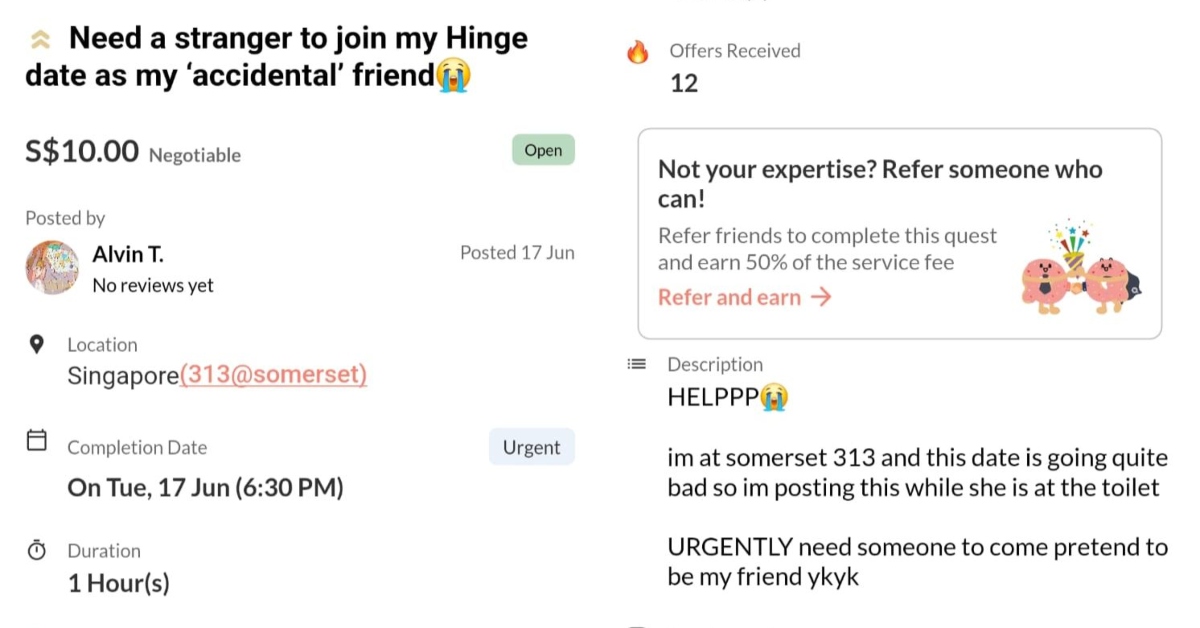Just a month ago, Quest’s founders were listed under the Forbes 30 Under 30 Asia 2025 list—a major milestone for the homegrown startup.
Launched in June 2021 by then-SMU undergraduates Craig Choy, Evan Chow, and Matthew Wu, Quest is an AI-powered platform that matches gig workers with freelance jobs, from wedding hosts to part-time content creators.
It was born out of a desire to revive the failed attempts of earlier startups. A decade ago, when TaskRabbit was known to be the go-to platform for hiring individuals to run errands, the city-state saw an influx of similar businesses in Singapore, but these local versions eventually fizzled out, plagued by challenges such as limited market demand, labour shortages, and razor-thin profit margins.
But 10 years is a long time, and the landscape looks like it has shifted. Quest seems to have landed at just the right moment, and it’s clearly gaining traction.
According to its website, the platform has amassed over 450,000 registered users across Singapore, the United States, and the Philippines, and together they have earned more than US$6 million in gig income through the app.
The startup has also secured over US$500,000 in funding from investors, including Antler and Oneness Holding.
A platform for everything and anything

On Quest’s platform, users (and businesses) can list virtually anything, including errands and odd jobs. These are picked up by “heroes” who accept the task in return for a cash reward set by the user.
Posting a task is free, but the platform charges a booking fee once a hero accepts the job.
While browsing the app, we came across some pretty entertaining listings—one user even paid for a boosted post in a bid to get immediate help escaping a disastrous date.
After all, as Quest’s tagline puts it, you could “hire a hero for pretty much anything.”

Since users set their own prices for tasks, we also noticed a wide range of rates for similar jobs, but as the saying goes, it’s a case of willing buyer, willing seller. The screenshot above shows different prices for a similar task, likely because one is more time-sensitive than the other.
For those unsure of how to price their task, however, Quest offers AI-powered tools that recommend a fair rate. According to its website, the system draws on data from similar tasks and takes into account factors such as difficulty, required skill level, urgency, location, and current market demand.
To get started on the platform, you can download the Quest app from the App Store or Play Store—but for an even simpler option, just WhatsApp Quest directly.
There’s no need to navigate the app or even create an account. Simply message what you need, whether it’s running errands, hiring part-timers, or finding creative talent, and Quest’s AI-powered concierge will take care of the rest. Do note that there will be an additional S$10 booking fee, though.

With platforms like Quest, safety is definitely a key concern. To minimise risks of crime, especially for tasks involving valuable goods, it has implemented measures, including requiring users to verify their identity via Singpass.
All chat interactions within the app are also public until a transaction is made. A private chat between users and heroes will only be opened once the job has been completed and payment processed, but even then, Quest’s team actively monitors conversations for safety and transparency.
Why Quest works and why now?
With user numbers climbing, Quest seems to be thriving despite its predecessors having struggled to survive in the same space.
So, what’s different this time around?
Much of it comes down to timing and shifting needs. Today’s economy is far more gig-friendly—a trend accelerated by the COVID-19 pandemic, which fundamentally reshaped how people think about employment.
More individuals have begun turning to gig jobs and flexible employment, and in Singapore, this shift has been particularly noticeable. As of 2022, the country had around 88,400 platform workers, making up 3.6% of the resident labour force, a significant increase compared to previous years.
Quest capitalises on this shift by providing a platform that caters to people looking for flexible, task-based income. It offers something traditional job portals don’t: immediate, hassle-free income opportunities with minimal red tape.
Convenience is also a major draw. Tasks can be listed and picked up within minutes, and users can cash out their earnings quickly, sometimes even on the same day. Most functions within the platform are also automated.
With these advantages, Quest has built a sturdy bridge between supply and demand in the on-demand labour market.
Where earlier platforms stumbled, it is proving that with the right timing, tech, and trust, the gig economy can finally deliver.
Featured Image Credit: Quest













